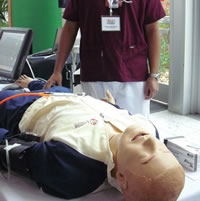How to Become a Licensed Practical Nurse

Michael McEwen is an instructor in the licensed practical nursing program at Renton Technical College in Renton, Washington. He earned a Bachelor of Science in nursing at Pacific Lutheran University, and a Master of Science in nursing at Seattle Pacific University. Michael has been a nursing instructor for the past 7 years, but has spent more than 20 years in the nursing field.
Why did you decide to enter the nursing field?
I was not able to get in a health science related program at my undergraduate school, but I had all the core requirements done, so I decided to transfer it over to a nursing school.
What is your favorite aspect of nursing?
Contact with new people, new technology and lifelong learning. I can reinvent myself in a different nursing specialty.
What is your least favorite aspect of nursing?
The pay is out of range for the responsibilities the nurse is charged with. There are long hours and weekend work.
Are there subfields of nursing that students might not be aware of?
Yes, there are forensics, genetics and informatics.
Are there common misconceptions about licensed practical nursing?
One common misconception is that it’s easy. It will be very, very hard run to get through nursing school. It’s not a ½ hour daytime soap. Nursing school will consume much of your free time until it’s done.
What kind of training is required to work as a licensed practical nurse?
For my school, students are required to have basic science classes in biology, chemistry, and anatomy and physiology. In addition, students are to have a certified nursing assistant license.
What personality traits do you think a student should have in order to be successful in a licensed practical nursing program?
A desire to help others, openness to criticism and ability to be flexible.
What electives would you recommend that a student in a licensed practical nursing program take?
Chemistry, biology, anatomy and physiology. Also writing/language would be a great asset to ESL students.
What study tips would you give to a student to help him or her succeed in a licensed practical nursing program?
Like CPR, early access, early intervention is essential. Don’t wait until after the first bad test to get help. Work with peers, instructors, and campus student services to get help. Study groups help, as does identifying what kind of learning style works. There is help for dyslexic students nowadays. For ESL, have an excellent grasp of English. There will be no time to work on language skills in nursing class.
Do you think licensed practical nursing is a subject that can be studied online, or is a traditional class environment ideal?
Online study requires a lot of self discipline and it is not for everyone. Also part of nursing is the socialization and that is taken to a minor role in online classes. I did it once and did not like the impersonal interaction.
What pieces of advice, or caution, would you offer to a prospective licensed practical nursing student?
You have to really want to be a nurse yourself, not because mother wants you to be a nurse or your best friend is a nurse. It takes a certain degree of desire and character to make it work.
Photo Source: Life Sciences Research Weekend 2010